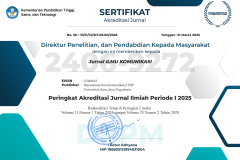Persepsi <i>Digital Dependent</i> terhadap Pemanfaatan Media Sosial dan Dampak Sosial Ekonominya
DOI:
https://doi.org/10.24002/jik.v15i1.1325Keywords:
digital dependent generation, social media, socio-economic impact.Abstract
The aim of the study was to have empirical evidence of using social media, positive and negative impacts in the social and economic fields. A total of 179 respondents accounting students at one private university in Yogyakarta. Data had collected by questionnaire. Furthermore, the data had analyzed qualitatively by using descriptive statistics and item analysis. The implications are useful for digital dependent to be wise in using social media and aware of the positive and negative impacts. In addition, for companies and providers useful to analyze for the utilization of economic and social potential of social media.
References
DAFTAR PUSTAKA
Cawidu, Ismail. (2016). Pemanfaatan Media Sosial, dipresentasikan dalam acara Rapat Kerja Pustakawan XX Ikatan Pustakawan Indonesia, ppt diunduh tgl 10 Juni 2017.
Daniel J. Power & Gloria Phillips-Wren. (2011). Impact of Social Media and Web 2.0 on Decision-Making. Journal of Decision Systems. Vol.20:3, pp.249-261, DOI: 0.3166/jds.20.249-261. http://dx.doi.org/10.3166/jds.20.249-261.
Elefant, C. (2011). The “Power” of Social Media: Legal issues and best practices for utilities Engaging Social Media. Energy Law Journal, 32, 1–56.
Kaplan A.M. and Haenlein M., (2010). Users of the World, Unite! The Challenges and Opportunities of Social Media”, Business Horizons, Vol. 53, No. 1, 2010, p. 59-68.
Kleinschmit, Matt. (2015). Generation Z characteristics: 5 infographics on the Gen Z lifestyle : https://www.visioncritical.com/author/matt-kleinschmit diakses 12 Juli 2017.
Lee, Lian Fen; Amy Hutton, dan Susan Shu. (2015). The Role of Social Media in the Capital Market: Evidence from Consumer Product Recalls. Forthcoming Journal of Accounting Research. Diunduh tgl 01 Mei 2017.
Lynn A. McFarland and Robert E. Ployhart. (2015). Social Media: A Contextual Framework to Guide Research and Practice. Journal of Applied Psychology, Vol. 100, No. 6, 1653–1677 diunduh tanggal 12 Juni 2017.
Mihaela Jucan, Cornel Jucan, dan Ilie Rotariu. (2013). The Social Destination: How Social Media Influences the Organisational Structure and Leadership of DMOs”. World Academy of Science, Engineering and Technology International Journal of Social, Behavioral, Educational, Economic, Business and Industrial Engineering Vol:7, No:6, 2013 diunduh tgl 01 Mei 2017.
Next Generation Recruitment, (2017). http://bi.ly/genXYZ diunduh 18 Juli 2017
Power, D,J. dan Gloria P.W. (2012). Impact of Social Media and Web 2.0 on Decision-Making. Journal of Decision Systems. 20:3, 249-261, DOI: 10.3166/jds.20.249-26. Diunduh tgl 20 Juni 2017.
Press release APJI di unduh dari http://internetsehat.id/2016/10/apjii-jumlah-pengguna-internet-indonesia-lebih-dari-50-populasi/ tanggal 08 Juli 2017
Siddiqui dan Singh. (2016). Social Media its Impact with Positive and Negative Aspects. International Journal of Computer Applications Technology and Research .Volume 5– Issue 2, 71 – 75
Simon Kemp (2017). Digital in 2017: Global Overview. https://wearesocial.com/special-reports/digital-in-2017-global-overview. Diunduh 16 Juli 2017
Student Journal of Media Literacy Education (2010), Issue 1, Volume 1 diunduh tanggal 01 Mei 2017.
Shower, R. (2017). Social Media Demographics: What You Need to Know [Infographic]. (https://www.tracx.com/resources/blog/social-media-demographics-2017-marketers/
What Is “Edgy” Marketing, Anyway, And Why Does It Disgust Us? http://www.outnoise.com/what-is-edgy-marketing-anyway-and-why-does-it-disgust-us/jenna-noise/ diunduh 19 juli 2017
Zheng Xiang A, Ulrike Gretzel. (2010). “Role of Social Media in Online Travel Information Search”. Tourism Management. Vol.31. pp.179–188www.elsevier.com/locate/tourman Diunduh tanggal 10 Juli 2017.
Downloads
Published
Versions
- 2022-03-15 (2)
- 2018-06-02 (1)
How to Cite
Issue
Section
License
Jurnal ILMU KOMUNIKASI is an academic journal. As such, it is dedicated to the open exchange of information. For this reason, JIK is freely available to individuals and institutions. Authors who publish in Jurnal ILMU KOMUNIKASI will release their articles under the Creative Commons Attribution (BY) License. This license allows anyone to copy and redistribute the article in any medium or format as well as remix, transform, and build upon the material for any purpose, even commercially as long as they credit the authors for the original creation. For details of the rights authors grants users of their work, see the "human-readable summary" of the license, with a link to the full license. (Note that "you" refers to a user, not an author, in the summary)
 This work is licensed under a Creative Commons Attribution 4.0 International License.
This work is licensed under a Creative Commons Attribution 4.0 International License.














